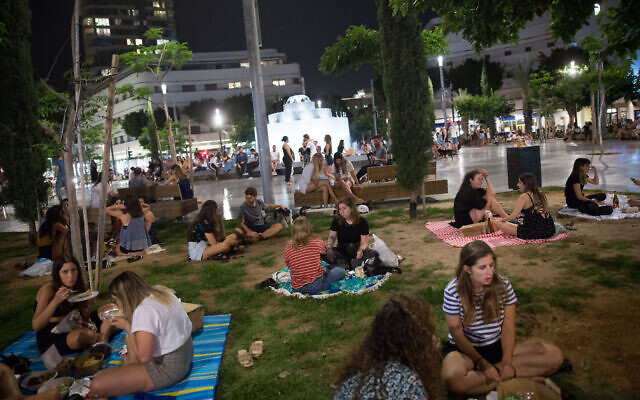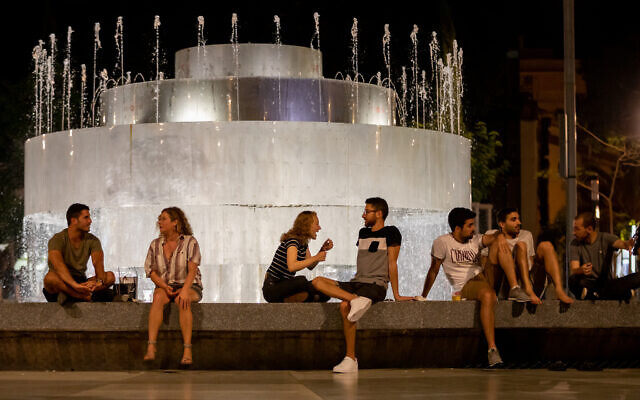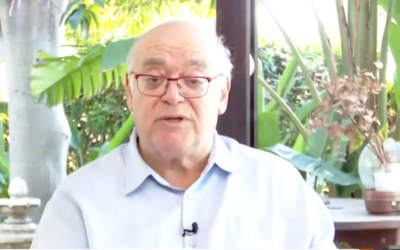As patients in serious condition jump by 35 in 24 hours to 252, ministers reportedly concerned young people will continue to gather when bars and cafes close

Senior government officials on Sunday were reportedly weighing imposing weeknight lockdowns in addition to the ones planned for weekends, amid concerns that young Israelis will resort to gathering at public parks and squares, as a result of the shuttering of restaurants, bars and cafes.
The news came as Israel’s case count passed 50,000, standing at 50,289 Sunday night, with 28,205 of them active, and serious cases reached 252, of which 70 were on ventilators. The Health Ministry said 1,438 had been diagnosed in the past 24 hours.
Kan news reported that nightly lockdowns were being considered for at least the remainder of summer vacation, during which larger amounts of young people are prone to go out. Without such an order, some government officials are concerned that Israelis will begin hosting house parties which are harder for police to enforce against, the report said.
While the government shuttered bars and clubs earlier this month, some night-life institutions — particularly in Tel Aviv — have remained open by posing as cafes, though these, along with restaurants, are also set to be ordered shut on Tuesday morning, except for delivery and takeaway services.
But officials involved in government discussions have expressed concern that the shutting of what’s left of Israeli night-life will not be enough to prevent crowding, Kan reported, making a lockdown necessary.

Weekend lockdowns, which have still not been ratified by the government, are believed to be the brainchild of Ben Gurion University’s Dov Schwartz.
Schwartz, who serves on an interdisciplinary team studying the pandemic at Ben Gurion, told Channel 12 Sunday that nightly and weekend lockdowns were necessary, along with a requirement that all Israelis over the age of 67 remain in their homes for the next 30 days, in order to salvage the healthcare system.
Failure to take drastic steps quickly, he warned, could lead in three weeks’ time to “a total breakdown” of the system. Schwartz claimed it would become overwhelmed by critically ill patients hooked up to respirators, with doctors being forced to decide who will get a breathing machine and who will be left to die, as was the case in Italy during the early months of the pandemic.
Earlier Sunday, the Knesset’s Coronavirus Committee met to review measures approved by the government over the weekend aimed at reducing the country’s climbing rate of infection, with the panel’s chair saying it was not clear that the restrictions are the right course of action.
After hours of discussion, the panel ultimately urged the cabinet to reverse its decision to close restaurants starting Tuesday, and instead to allow them to operate at a third of capacity indoors, and while maintaining necessary distancing between customers outdoors. It also called to allow beaches to remain open and to allow gyms to continue to operate under strict distancing measures.
The committee will reconvene Monday to review the cabinet’s response and to vote on the measures.

With ministers having agreed in principle to impose stringent restrictions for the whole country on weekends from Friday, July 24, and warning that a full-scale national lockdown was looming, committee chair MK Yifat Shasha-Biton (Likud) said it was not clear that these kinds of steps were necessary. Shasha-Biton’s job is reported to be at risk for what the prime minister appears to view as excessive legislative activism; her committee’s support is crucial for decisions approved by ministers to be implemented.
Amid an ongoing rise in national infection rates, regulations announced in the early hours of Friday morning severely limited public gatherings until further notice, ordered the open-ended closure of restaurants for in-house seating for the foreseeable future (though that move was delayed to Tuesday after massive backlash by restaurateurs), ordered the open-ended closure of gyms and exercise/dance studios, and imposed multiple closures on weekends going forward, including of beaches, parks and other recreational activities.
According to recent legislation, the cabinet can swiftly pass emergency coronavirus regulations without the need for Knesset approval, but the legislature must sign off on the decisions within a week or they are automatically annulled.
Netanyahu and Health Minister Yuli Edelstein have repeatedly warned in recent days that the latest restrictions were necessary in order to avoid a full lockdown down the road.
As reported by The Times of Israel
